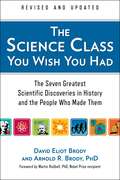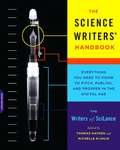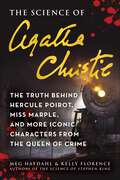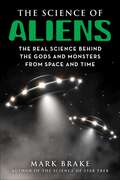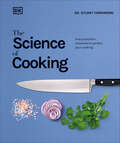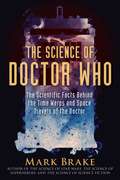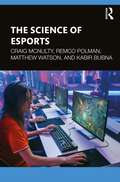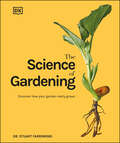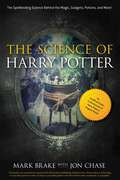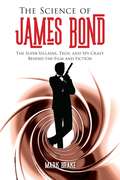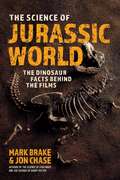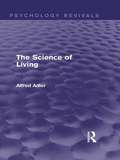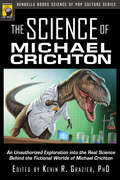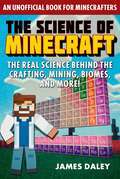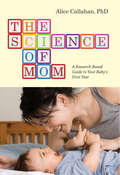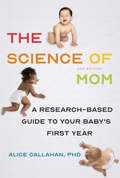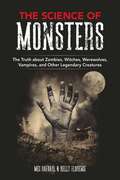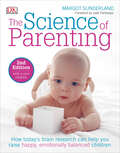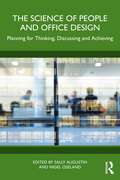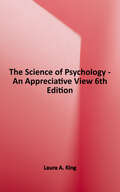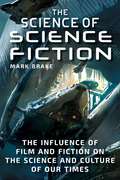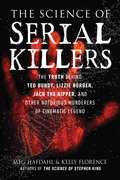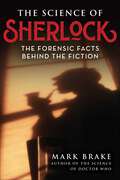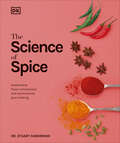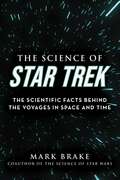- Table View
- List View
The Science Class You Wish You Had (Revised Edition)
by A. Brody D. BrodyWhat does E=mc2 really mean? What is DNA? What was the big bang? These scientific concepts have changed our perception of the world...but for many of us they remain mysteries, bits and pieces of information retained from classroom lectures but never truly understood. Now we can finally grasp the grandeur and complexity of these ideas, and their significance in our lives. Revised and updated to include the latest discoveries that are changing the way we view the world and the universe, this new edition of The Science Class You Wish You Had will take you on a journey through space and time--from the subatomic to the universal. It explains in a lively, accessible way what these milestones of scientific discovery mean and what direct impact they have on our lives today and will have in the future. For everyone interested in science, history, and biographies of extraordinary people--or anyone who wants to understand the workings of the physical world--this thorough and authoritative book is a perfect introduction to science's most profound discoveries, and a testament to the triumph of human knowledge. Newton: Gravity and the Basic Laws of Physics Rutherford and Bohr: The Structure of the Atom Einstein: The Principle of Relativity Hubble: The Big Bang and the Formation of the Universe Darwin: Evolution and the Principle of Natural Selection Flemming and Mendel: The Cell and Genetics Watson and Crick: The Structure of the DNA Molecule
The Science Writers' Handbook: Everything You Need to Know to Pitch, Publish, and Prosper in the Digital Age
by Thomas Hayden Michelle NijhuisPopular science writing has exploded in the past decade, both in print and online. Who better to guide writers striving to succeed in the profession than a group of award-winning independent journalists with a combined total of 225 years of experience? <P><P>From Thomas Hayden’s chapter on the perfect pitch to Emma Maris’s advice on book proposals to Mark Schrope’s essential information on contracts, the members of SciLance give writers of all experience levels the practical information they need to succeed, as either a staffer or a freelancer. Going beyond craft, The Science Writer’s Handbook also tackles issues such as creating productive office space, balancing work and family, and finding lasting career satisfaction. It is the ultimate guide for anyone looking to prosper as a science writer in the new era of publishing.
The Science of Agatha Christie: The Truth Behind Hercule Poirot, Miss Marple, and More Iconic Characters from the Queen of Crime (The Science of)
by Meg Hafdahl Kelly FlorenceUncover the theories behind Dame Agatha Christie's most thrilling mysteries: Murder on the Orient Express, Death on the Nile, The A.B.C. Murders, and so much more! Gothic media moguls Meg Hafdahl and Kelly Florence, authors of The Science of Stephen King and co-hosts of the Horror Rewind podcast called &“the best horror film podcast out there&” by Film Daddy, present a guide to the Agatha Christie stories and supersleuths we all know and love. Through interviews, literary and film analysis, and bone-chilling discoveries, The Science of Agatha Christie uncovers the science behind the sixty-six detective novels and fourteen short story collections that have become an integral part of the modern murder mystery, answering such questions as: What is the science behind the poisons used to commit murders in Agatha Christie&’s stories? When did crime investigation become more common as seen in Murder on the Orient Express? Has science made it possible to uncover the truth behind the investigative powers of Hercule Poirot and Miss Marple? How did Agatha Christie use isolated settings to best explore the psychology of her characters? Join Kelly and Meg as they discover why sometimes the impossible must be possible!
The Science of Aliens: The Real Science Behind the Gods and Monsters from Space and Time (The Science of)
by Mark BrakeDiscover the real science behind 2001, ET, Signs, and all your favorite fictional alien civilizations.As space telescopes continue to search for life in this unearthly Universe, the crucial questions remain unanswered. Are we awake to the revolutionary effects on human society and science that alien contact will bring? And how is it possible to imagine the unknown? The Science of Aliens tells the compelling story of how the portrayal of alien life has evolved over time.Taking examples from science, film, and fiction, this book showcases how scholars, filmmakers, and authors have devoted their energies to imagining life beyond this Earth. From Copernicus to Kubrick, The Science of Aliens is a fascinating account for anyone interested in extraterrestrials.Otherworldly topics include:What Xenomorphs from Alien and Na&’vi from Avatar have in commonDarwin among aliensExtraterrestrials in Einstein&’s skyAliens in our space ageAnd so much moreVisualize the unknown and redefine your place in a changing cosmos with The Science of Aliens.
The Science of Cooking: Every Question Answered to Perfect Your Cooking
by Dr. Stuart FarrimondEvery question you&’ve ever had about everyday cooking and the science behind it — answered.How do I cook the perfect steak? How does citrus juice cook raw fish? Why does garlic make your breath smell? This fascinating science-based cookbook sheds light on questions that have puzzled generations of cooks!Discover a recipe book like no other from TV personality, food scientist and bestselling author Dr. Stuart Farrimond. Inside, you&’ll discover: • Dynamic, full-color visuals make complex scientific concepts compelling and easy to understand. • Engaging question-and-answer format makes the science relevant to everyday cooking. • User-friendly book structure, with scientific concepts organized by food group and ingredient. • Step-by-step techniques — which demonstrate and underpin key concepts — add core, practical cooking instruction. Discover the techniques behind cookingA good recipe goes a long way, but if you can master the science behind it, you&’ll be one step ahead. The Science of Cooking shows you how by bringing food science out of the lab and into your kitchen. It gives you all the scientific information you need to take your home cooking to a whole new, more nutritious level! From making great risotto and soft ice cream to the process of steaming, this gastronomic cookbook includes step-by-step techniques to help you perfect your cooking. 3D graphics and engaging text make scientific concepts easy to grasp, and infographics bring culinary facts and stats to life. It is the ultimate gift for any self-respecting foodie or cook!Hungry for more?Don&’t stop with The Science of Cooking - there are more books to discover! This series from DK is designed to help you perfect your cooking with practical instruction and understand what&’s going on behind the scenes as you cook! Explore the science behind the art of making incredible spice blends to help you release the flavor in your dishes with The Science of Spice.
The Science of Doctor Who: The Scientific Facts Behind the Time Warps and Space Travels of the Doctor (The Science of)
by Mark BrakeGeek out over the TARDIS, aliens, alternate timelines, parallel worlds, and all your favorite characters from the Doctor Who Universe!Doctor Who arrived with the Space Age, when the Doctor first began exploring the universe in a time-traveling spaceship. Over half a century since, the Doctor has gone global. Millions of people across this planet enjoy Doctor Who in worldwide simulcast and cinema extravaganzas. Doctor Who has infused our minds and our language and made it much richer.What a fantastic world we inhabit through the Doctor. The program boils over withballsy women, bisexual companions, scientific passion, and a billion weird and wonderful alien worlds beyond our own. The show represents almost sixty years' worth of magical science-fiction storytelling. And Doctor Who is, despite being about a thousands-of-years-old alien with two hearts and a spacetime taxi made of wood, still one of our very best role models of what it is to be human in the twenty-first century.In The Science of Doctor Who, we take a peek under the hood of the TARDIS and explore the science behind questions such as:What does Doctor Who tell us about space travel? Could the TARDIS really be bigger on the inside?In what ways does the Doctor view the end of our world? Is the Doctor right about alternate timelines and parallel worlds?Will intelligent machines ever rule the earth?Is the earth becoming more like Doctor Who's matrix?Is the Doctor a superhero? How do daleks defecate?So welcome to The Science of Doctor Who, where the Doctor steps smoothly in and out of different realities, faces earthly and unearthly threats with innovation and unpredictability, and successfully uses science in the pay of pacifist resistance!
The Science of Esports
by Matthew Watson Craig McNulty Remco Polman Kabir BubnaThe Science of Esports draws from contemporary research and coach expertise to examine esports athlete health and performance from a range of disciplinary perspectives, including physiology, psychology, sociology, and nutrition. The rapid expansion of the esports industry has elevated competitive video gaming into the realm of high performance, requiring players, coaches, and practitioners to implement interdisciplinary approaches to performance support. The book covers key topic areas such as: What esports is and similarities and differences to sport Game-specific training Physiological and psychological consideration for esports athletes Social aspects of player performance and the social environment of esports Esports coaching and structure of esports performance environments Technology and its use in esports Safeguarding, cheating, and gambling This book includes worked examples and case studies to allow immediate implementation into practice for esports athletes and coaches. It summarises the current state of research to inform researchers and identify gaps in knowledge. This book is critical reading for students of esports and related courses. It serves as the first scientific resource designed to provide athletes, coaches, and practitioners with interdisciplinary insights into esports health and performance.
The Science of Gardening: Discover How Your Garden Really Works
by Dr. Stuart FarrimondExploding myths and providing key takeaway advice for gardeners at any level, this book provides a shortcut to decades of gardening experience by explaining the science behind how a garden grows.How often should I water my plants? What&’s the most effective slug deterrent? Could I breed my own unique variety of flower? Do plants have intelligence? Does it really matter when and how I prune? And why is my compost heap so slimy? If you find yourself seeking the answers to these questions and many more, then this may be the book for you!The world of gardening can be a mystifying place, with so many instructions to follow and often little explanation as to why. Dr Stuart Farrimond casts his scientific eye over the garden to answer all the horticultural questions you&’ve ever wondered about.Get your gardening gloves on and dive straight in to discover:- An accessible guide structured around the life cycle of the garden, taking you from first shoots to pruning for renewal.- An accessible Q &A format, with stats and infographics to bring the story to life, as well as long-held gardening myths are exploded by new science.- Every way to greener fingers has action points so that you can understand the science, apply your gardening practice, and enjoy a flourishing garden.From hands-on, practical advice, to an exploration of the mental health benefits of gardening, whilst also covering topics such as the positive impact gardening can have on the earth during a time of climate crisis, The Science of Gardening debunks myths, and reveals the latest science often only taught at horticultural college. As a passionate newcomer to gardening, daunted by the mountain of often conflicting advice in gardening manuals, Dr Stuart Farrimond has set about testing the scientific basis of so much conventional wisdom and practice so you too can garden like a pro.A must-have gardening book for keen beginners with a passion for plants but who are daunted by the prospect of trawling through traditional gardening manuals for explanations, as well as experienced gardeners who are intrigued to find out the theory behind their practice and who want to improve on where they might be getting something wrong.At DK, we believe in the power of discovery. So why stop there? If you like Science of Gardening, then why try Science of Cooking or Science of Spice to complete the collection.
The Science of Harry Potter: The Spellbinding Science Behind the Magic, Gadgets, Potions, and More! (The Science of Series)
by Mark Brake Jon ChaseHow does magic in J. K. Rowling’s universe work? Finally, the scientific secrets are revealed!The story of the boy who lived has brought the idea of magic and sorcery into mainstream fruition more than any other book series in history. Modern muggle scientists have uncovered explanations to the seemingly impossible, including answers to such questions as: Will we ever see an invisibility cloak? How hazardous is a flying broomstick like the Nimbus 2000? How has medicine made powerful potions from peculiar plants? (Felix Felicis, anyone?) Can scientists ever demonstrate Wingardium Leviosa, or the flying power of a Golden Snitch? Is it possible to stupefy someone? And many more!Often perceived as a supernatural force, magic captivates and delights its audience because of its seeming ability to defy physics and logic. But did you ever wonder if science has any explanation for these fantastic feats? The Science of Harry Potter examines the scientific principles—behind some of your favorite characters, spells, items, scenes, and even games like Quidditch and Wizard’s Chess—from boy wizard Harry Potter’s world, providing in-depth analysis and scientific facts to support its theories. Author Mark Brake, whose The Science of Star Wars was a knockout success, has found the answers to satisfy the curious spirits of muggles everywhere…A perfect Harry Potter gift for anyone obsessed enough to stand in line to be the first to see Harry Potter and the Cursed Child or Fantastic Beasts and Where to Find Them, witches and wizards alike will be fascinated by the merging of this improbable realm and real science!
The Science of James Bond: The Super-Villains, Tech, and Spy-Craft Behind the Film and Fiction (The Science of Series)
by Mark BrakeSpy-Fi Culture with a License to KillFrom Sean Connery to Daniel Craig, James Bond is the highest-grossing movie franchise of all time. Out-grossing Star Wars, Harry Potter, and the Marvel Cinematic Universe, the world&’s most iconic and international secret agent has a shelf life of almost six decades, from Dr. No to Spectre. As nuclear missile threats are replaced by a series of subtler threats in a globalized and digital world, Bond is with us still.In The Science of James Bond, we recognize the Bond franchise as a unique genre: spy-fi. A genre of film and fiction that fuses spy fiction with science fiction. We look at Bond&’s obsessions with super-villains, the future, and world domination or destruction. And we take a peek under the hood of trends in science and tech, often in the form of gadgets and spy devices in chapters such as:Goldfinger: Man Has Achieved Miracles in All Fields but Crime!You Only Live Twice: The Race to Conquer SpaceLive and Let Die: Full Throttle: Bond and the CarSkyfall: The Science of CyberterrorismAnd more!This is the only James Bond companion that looks at the film and fiction in such a spy-fi way, taking in weapon wizards, the chemistry of death, threads of nuclear paranoia, and Bond baddies&’ obsession with the master race!
The Science of Jurassic World: The Dinosaur Facts Behind the Films (The Science of)
by Mark Brake Jon ChaseA tale of some of the most amazing creatures ever to grace this tiny planet—unearth how the science fiction of the Jurassic World franchise inspired the evolution of dinosaur science. It all began in 1993. Jurassic Park was a movie landmark in the development of computer-generated imagery and animatronic visual effects. Jurassic Park became the highest-grossing movie of that year, and the highest-grossing film ever at the time, a record held until the 1997 release of Titanic. The field of dinosaur science has blossomed by leaps and bounds and branched out in recent years, in no small part to this iconic movie series. In The Science of Jurassic World, we experience the amazing story of the birth of the dinosaurs, how they evolved to world dominance, how some became gargantuan in size, how others grew wings and flew, and how the rest of them met an untimely end. Chapters include: How did Jurassic Park transform dinosaur science?Was Dr. Alan Grant&’s job a walk in the park?What&’s with the giant dinosaur poop?When will we clone dinosaurs?And so much more! Discover how some of cinema&’s most incredible creations do justice to the jaw-dropping evolution of these fantastic creatures.
The Science of Living (Psychology Revivals)
by Alfred AdlerOriginally published in 1930 The Science of Living looks at Individual Psychology as a science. Adler discusses the various elements of Individual Psychology and its application to everyday life: including the inferiority complex, the superiority complex and other social aspects, such as, love and marriage, sex and sexuality, children and their education. This is an important book in the history of psychoanalysis and Adlerian therapy.
The Science of Michael Crichton: An Unauthorized Exploration into the Real Science Behind the Fictional Worlds of Michael Crichton
by Michael CrichtonMichael Crichton’s thrillers traverse the cutting edge of science and then push the envelope. How realistic are his takes on subjects ranging from dinosaur cloning to global warming, nanotechnology to time travel, animal behavior to human genetics? The Science of Michael Crichton gathers essays from prominent experts that examine the amazing inventions of Crichton’s books and lift up the hood, revealing the science underneath—exploring which Crichton imaginings are feasible and which are just plain impossible. Computer science innovator Ray Kurzweil looks at how virtual reality is portrayed in The Terminal Man; anthropologist Ian Tattersall takes on Crichton’s depiction of Neanderthals in Eaters of the Dead; meteorologist David Lawrence discusses global warming in State of Fear—and much more, in a fascinating volume that separates the science from the fiction.
The Science of Minecraft: The Real Science Behind the Crafting, Mining, Biomes, and More! (The Science of)
by James DaleyDiscover the science behind the Minecraft phenomenon! With more than 200 million units sold, Minecraft is the undisputed bestselling video game of all time. Since it first launched, the game&’s groundbreaking mix of open-world exploration, creative construction, and stunningly simple graphics have kept players old and young alike constantly coming back to explore, survive, and create. Even now, a decade after its release, there are still more than 126 million active users supporting not only the game, but an entire universe of movies, comics, conventions, classes, and so much more. A perfect gift for any Minecraft enthusiast, The Science of Minecraft explores some of the game&’s most popular topics and gameplay mechanics, including: ResourcesMiningConstructionCraftingMechanical DevicesBiomesWeapons and ArmorAnd So Much More This book explains how the game&’s famous construction mechanics would function in real life, what its many natural resources share (or do not share) with their terrestrial counterparts, and what the deal is with the mysterious alternative dimensions of the Nether and the End. Whether you&’re a fan of creative or survival mode, The Science of Minecraft will illuminate and inspire you with the scientific realities behind this iconic game.
The Science of Mom: A Research-Based Guide to Your Baby's First Year
by Alice CallahanThe Science of Mom blogger makes sense of research studies for new mothers.It seems like every time a new mother turns on her computer, radio, or television, she is greeted with news of yet another scientific study about infancy. Ignoring good information isn’t the right course, but just how does one tell the difference between solid studies, preliminary results, and snake oil? In this friendly guide through the science of infancy, Science of Mom blogger and PhD scientist Alice Callahan explains how non-scientist mothers can learn the difference between hype and evidence. Readers of Alice’s blog have come to trust her balanced approach, which explains the science that lies behind headlines. The Science of Mom is a fascinating, eye-opening, and extremely informative exploration of the topics that generate discussion and debate in the media and among parents. From breastfeeding to vaccines to sleep, Alice’s advice will help you make smart choices so that you can relax and enjoy your baby.
The Science of Mom: A Research-Based Guide to Your Baby's First Year
by Alice CallahanNow updated! The new edition of this best-selling guide uses science to tackle some of the most important decisions facing new parents—from sleep training and vaccinations to breastfeeding and baby food.Is cosleeping safe? How important is breastfeeding? Are food allergies preventable? Should we be worried about the aluminum in vaccines? Searching for answers to these tough parenting questions can yield a deluge of conflicting advice. In this revised and expanded edition of The Science of Mom, Alice Callahan, a science writer whose work appears in the New York Times and the Washington Post, recognizes that families must make their own decisions and gives parents the tools to evaluate the evidence for themselves. Sharing the latest scientific research on raising healthy babies, she covers topics like the microbiome, attachment, vaccine safety, pacifiers, allergies, increasing breast milk production, and choosing an infant formula.
The Science of Monsters: The Truth about Zombies, Witches, Werewolves, Vampires, and Other Legendary Creatures
by Meg Hafdahl Kelly FlorenceA must-have for any fan of horror and fantasy movies—Night of the Living Dead, A Nightmare on Elm Street, The Shining (Stephen King), and so many more! If you love film that scares, and want to believe that zombies, vampires, and other deadly and terrifying creatures could be real, let Meg Hafdahl and Kelly Florence, the women behind the Horror Rewind podcast called “the best horror film podcast out there” by Film Daddy, take you to the world where horror and science meet. How would a zombie really decompose in Night of the Living Dead?Are there instances of shape shifting in nature like in The Wolf Man?What is the science behind the night terrors that inspired the creation of Freddy Krueger?Is there scientific data supporting ghost detection like the tools used in Poltergeist?What is the psychological drive that compels cannibals like Hannibal Lecter?How does modern medicine and therapy differ from what would have been offered to Norman Bates in 1960?How are subliminal messages related to propaganda or brainwashing like in The Ring?What would the scientific explanation be for witches possessing people like in Carrie?Was The Blair Witch Project based on any real or imagined creature that came before?”And so much more! Gothic media moguls Meg Hafdahl and Kelly Florence revisit the films from their childhood to discover the science behind the fear. Join Kelly and Meg as they unravel the medical mysteries and scientific marvels that inspired the creation of famous monsters like Nosferatu, Norman Bates, Dracula, Frankenstein, and many more. An approachable and frightfully fun examination of what goes bump in the night, The Science of Monsters will thrill every horror fan.
The Science of Parenting: How Today’s Brain Research Can Help You Raise Happy, Emotionally Balanced Childr
by Margot SunderlandBacked by the most up-to-date scientific research, The Science of Parenting, 2nd Edition provides evidence-based parenting advice about how you should care for your child, with practical strategies from birth to 12 years of age. Child psychotherapist Dr. Margot Sunderland has more than 30 years' experience that she brings to this internationally-acclaimed guide, and she provides numerous case studies to relate the science to real life.From separations and time apart to forms of discipline to the latest thinking on screen time, this guide traces the direct effect of different parenting practices on your child's brain. Summaries at the end of every chapter provide key takeaways and make action points simple and clear so you can begin to implement them immediately.As a professional who works with families, Dr. Sunderland is attuned to the struggle of parents juggling lives at work and at home. This second edition of The Science of Parenting provides newly added, invaluable advice on making the most of your time with your child, so that you can forge a strong bond and have a positive relationship.The Science of Parenting remains the greatest work on what science can teach us about parenting and the remarkable effects of love, nurture, and play on a child's development.
The Science of People and Office Design: Planning for Thinking, Discussing and Achieving
by Sally Augustin Nigel OselandThe Science of People and Office Design: Planning for Thinking, Discussing and Achieving has been written for practitioners who would like to apply evidence-based and human-centric design principles to office and workplace design. Practitioner-researcher disconnects often arise due to a lack of meaningful connection between their professional worlds. This book seeks to rectify this disconnect and make it clear that research can significantly affect the likelihood that design projects achieve the objectives outlined in their briefs, and that practitioners need to have a real influence on research conducted.The book consists of 16 chapters,each grouped into three major sections, with an overview chapter and a conclusion drawn together by the editors. Each chapter addresses a real-world workplace design-related issue. The first part of each chapter presents the editors' overview of the problem in practice and the objectives that must be achieved via design solutions. The second portion of each chapter presents peer-reviewed research related to the chapter’s topic, written by a researcher focused on practical issues. The final part of each chapter is written by a workplace design practitioner and details their efforts to resolve the section’s real-world workplace design-related concern by applying relevant peer-reviewed research.The book is aimed at professionals working in business, interior design, architecture, surveying, facilities management, building services engineering, human resources and psychology who are key stakeholders in the design and delivery of modern office spaces. Postgraduates studying design, architecture, engineering, facilities management, environmental psychology and wellbeing will also find the book useful.
The Science of Psychology: An Appreciative View, 6th Edition
by Laura A. KingFocusing on why things go right, The Science of Psychology: An Appreciative View helps students understand and appreciate psychology as a science and as an integrated whole. Informed by student data, the program extends these themes and enhances their pedagogical value by helping students through topics they find the most challenging and offering learning resources to master them. With a deep integration of cultural diversity, the text offers a “Guide to Diversity, Equity, and Inclusion” in the Preface, providing a chapter-by-chapter list of topics involving DEI issues and research. When paired with Connect, students will also benefit from Thematic Relevancy Modules (brief, thought-provoking modules tied to the APA's IPI Student Learning Outcomes), Interactivities and Application-Based-Activities, Psych-at-Work videos (interviews with real people), the new and unique Immersive Brain, and more innovative resources to help further prepare them to be successful in this course.
The Science of Science Fiction: The Influence of Film and Fiction on the Science and Culture of Our Times
by Mark BrakeWe are the first generation to live in a science fiction world.Media headlines declare this the age of automation. The TV talks about the coming revolution of the robot, tweets tell tales of jets that will ferry travelers to the edge of space, and social media reports that the first human to live for a thousand years has already been born. The science we do, the movies we watch, and the culture we consume is the stuff of fiction that became fact, the future imagined in our past—the future we now inhabit.The Science of Science Fiction is the story of how science fiction shaped our world. No longer a subculture, science fiction has moved into the mainstream with the advent of the information age it helped realize. Explore how science fiction has driven science, with topics that include:Guardians of the Galaxy: Is Space Full of Extraterrestrials?Jacking In: Will the Future Be Like Ready Player One?Mad Max: Is Society Running down into Chaos?The Internet: Will Humans Tire of Mere Reality?Blade Runner 2049: When Will We Engineer Human Lookalikes?And many more! This book will open your eyes to the way science fiction helped us dream of things to come, forced us to explore the nature and limits of our own reality, and aided us in building the future we now inhabit.
The Science of Serial Killers: The Truth Behind Ted Bundy, Lizzie Borden, Jack the Ripper, and Other Notorious Murderers of Cinematic Legend (The Science of)
by Meg Hafdahl Kelly FlorenceDiscover the real-life inspirations behind history&’s most infamous serial killers: John Wayne Gacy, Jeffrey Dahmer, Charles Manson, and so many more. Gothic media moguls Kelly Florence and Meg Hafdahl, authors of The Science of Monsters, The Science of Women in Horror, and The Science of Stephen King, and co-hosts of the Horror Rewind podcast called &“the best horror film podcast out there&” by Film Daddy, present a guide to the serial killers who inspired the movies and media we all know and love. Delve into the brutal truth behind horror&’s secret: many monsters portrayed on the silver screen are based on true murderers. Uncover the truth behind the real monsters of horror, answering such questions as: What is the science behind serial killers&’ motivations like Ted Bundy and John Wayne Gacy? How did detectives discover the identities of criminals like the Boston Strangler and the BTK Strangler?Has science made it possible to unmask Jack the Ripper and the Zodiac Killer? What is the science behind female versus male serial killers? Through interviews, film analysis, and bone-chilling discoveries, join Kelly and Meg as they learn about the horrors of true crime through the decades.
The Science of Sherlock: The Forensic Facts Behind the Fiction (The Science of)
by Mark BrakeAn essential read for the legions of Sherlockians about the globe. Sherlock Holmes is the world&’s greatest-ever consulting detective. The huge popularity of Sir Arthur Conan Doyle&’s fictional creation, and his sixty stories, made Sherlock one of the most famous characters of Victorian London. All evidence of Sherlock&’s fan adoration has lasted almost one and a half centuries through many adaptations. There is Sherlock fan fiction in China, Sherlock manga in Japan, and tribute pop songs in Korea. Guinness World Records awarded Sherlock Holmes the title of most portrayed literary human character in film and television thanks to the popular Sherlock Holmes movies starring Robert Downey Jr., series like Elementary starring Lucy Liu, Sherlock starring Benedict Cumberbatch, and so much more. Sherlock&’s enduring appeal shows that his detective talents are as compelling today as they were in the days of Conan Doyle. The Science of Sherlock gives you an in-depth look at the science behind the cases Sherlock cracked in those Ripper streets of old.
The Science of Spice: Understand Flavor Connections and Revolutionize Your Cooking
by Dr. Stuart FarrimondTransform your dishes from bland and boring to punchy and flavorsome with this definitive guide to spices.It&’s time to spice up your home cooking!Taking the periodic table of spices as a starting point, this adventurous recipe book explores the science behind the art of making incredible spice blends to help you release the flavor in your dishes. Discover a spice book like no other from TV personality, food scientist and bestselling author, Dr Stuart Farrimond. Sure to get your tastebuds tingling, you can explore: - 52 exciting recipes from around the world which showcase each spice blend- An explanation of what spices are and how they're produced- Which countries favor which spices and a bit of the history behind it- Dozens of spice blends you can make and what you can use it for- A reference guide where you can conveniently look up each spice to understand how to use it- Various color-coded charts to help you learn the chemical compound that make up the flavors- Instructions on how to design your own spice blends- Beautiful photographs of spices and foodGreat cooking goes beyond following a recipe - it's knowing how to use the right combination of spices and herbs to get the greatest possible flavor from your dishes. From learning how the flavor compounds within spices work together to exploring the world's top spices, this is the perfect cookbook for curious cooks and adventurous foodies. Whether you&’re a fan of spice seeking to experiment with new flavor combinations, or simply a beginner-level home cook looking to advance your knowledge on all things spice related, this is a must-have volume also doubling up as a great coffee table book for the whole family to love.If you've ever wondered why some spices taste stronger than others or how to make your own personal garam masala, The Science of Spice has all the answers! Discover how to use spices for cooking to become more creative in the kitchen, and explore the multiple ways that spices can endlessly heighten your eating experience.At DK, we believe in the power of discovery. So why stop there? This series from DK is designed to help you perfect your cooking with practical instruction - and the science behind it. There are more cookbooks to discover from The Science of... series giving you the essentials to cook up a storm! Find the answers to your everyday cooking questions and get more out of your recipes with The Science of Cooking, paired together they make the ideal cookery gifts for your food-loving friends too!
The Science of Star Trek: The Scientific Facts Behind the Voyages in Space and Time (The Science of)
by Mark BrakeBoldly go where no man has gone before and discover the real science behind the cyborgs, starships, aliens, and antimatter of the Star Trek galaxy.Star Trek is one of the highest-grossing media franchises of all time. It has changed our cultural landscape in so many ways since it first aired in 1966. The franchise has generated billions of dollars in revenue, leading to a wide range of spin-off games, novels, toys, and comics. Star Trek is noted for its social science, too, with its progressive civil rights stances and its celebration of future diversity that began with The Original Series, one of television's first multiracial casts. The Science of Star Trek explores one of the greatest science-fiction universes ever created and showcases the visionary tech that inspired and influenced the real-world science of today. The perfect Star Trek gift for fans of the franchise, this book addresses many unanswered, burning questions, including: What can Star Trek tell us about aliens in our Milky Way?How has Star Trek influenced space culture?What can Star Trek tell us about planet hunting?What Star Trek machines came true?When will we boldly go? Learn more about one of our favorite modern epics with The Science of Star Trek!
